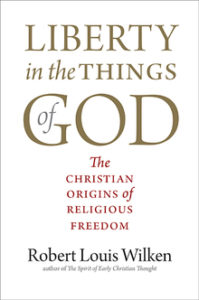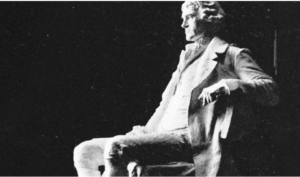A widely-held paradigm in Western intellectual history is that religious freedom originated with enlightened intellectuals during the seventeenth century. By this telling, philosophers fatigued by Europe’s never-ending wars of religion introduced new concepts about toleration and religious freedom which helped usher in the modern age. It was only as institutional religion weakened and religious beliefs diversified that the state saw liberty of conscience as a right worth protecting. Christian theology is usually seen as an unhelpful impediment to the emergence of today’s liberal consensus on religious freedom, if it is considered at all.
 Robert Louis Wilken’s latest book, Liberty in the Things of God: The Christian Origins of Religious Freedom, challenges this dominant narrative. Wilken argues that the concept of religious freedom originated with Christian thinkers in the first centuries of the church. Rather than impede the development of religious freedom, Christianity served as its impetus.
Robert Louis Wilken’s latest book, Liberty in the Things of God: The Christian Origins of Religious Freedom, challenges this dominant narrative. Wilken argues that the concept of religious freedom originated with Christian thinkers in the first centuries of the church. Rather than impede the development of religious freedom, Christianity served as its impetus.
To support his thesis, Wilken briefly surveys centuries of Christian reflection on religious freedom, beginning with Tertullian, the first person to use the phrase “freedom of religion.” In chapter one, Wilken identifies two important themes in Tertullian’s thinking. First, Tertullian believed that religion arises from inner conviction and thus consists of more than outward gestures and rituals. Whereas the Romans saw practice and outward conformity as the most important aspect of religion, Tertullian argued that belief — what Christians held in their heart — was what mattered. Moreover, because religious belief is inherently spiritual, it cannot be coerced. Second, Tertullian argued that religious freedom applied to the beliefs of communities, not just individuals. Wilken notes that Tertullian offered theological arguments for religious freedom rooted in a biblical understanding of the human person and the Imago Dei.
After attending to Tertullian, Wilken quickly summarizes subsequent developments in thought concerning religious freedom, moving toward an analysis of the changes brought on by the Reformation. In chapter two, he briefly discusses how ideas that had been first set forth in defense of persecuted Christians were reformulated and reinterpreted for Christians who began oppressing others. Wilken notes that some of Tertullian’s immediate successors differed with him on the efficacy of coercion. Augustine, for example, believed some forms of coercion were needed to punish schismatics who threatened the unity of the church. However, Tertullian’s view that humans are endowed with freedom and that religious faith is an inward disposition of the mind and heart (and therefore cannot be coerced) was not forgotten and was retrieved by later thinkers.

The uniformity of Western Christendom was shattered in the early sixteenth century with the onset of the Protestant Reformation. The resulting lack of a shared consensus on religion forced political and religious thinkers to rethink centuries-old assumptions about the relationship between church and state and about how society should be structured. Wilken devotes the rest of his book (chapters 3–9) to analyzing these questions.
Focusing on developments in Switzerland, France, England, and the Netherlands, Wilken traces the course of religious freedom thinking as it developed during this time of significant societal upheaval. He notes that one of the most consequential changes brought on by the Reformation was the formation of religious minorities within nations that had previously been united by a common confession. For example, in Catholic France, the emergence of the Huguenots eventually plunged the country into a bitter civil war. These events were repeated across Europe, as religious dissenters in other countries demanded religious freedom and were met with entrenched opposition.
Wilken’s presentation of history in an accessible and engaging manner is a strength of these chapters. With attention to the significant personalities and developments, Wilken shows how the movement toward greater toleration was slow but steady. He highlights one example from France, explaining that, similar to other countries, progress was slow, and at times regressed. Although the Edict of Nantes (which granted tolerance to French Calvinists) was signed in 1598, it was revoked in 1685. This illustrates the daunting challenges faced by those advocating for religious freedom. However, by relying on and rearticulating the themes initially expressed by Tertullian — including the inherently spiritual nature of faith and the futility of religious coercion — public opinion continued to shift during the sixteenth and seventeenth centuries.
Wilken concludes the book by returning to Tertullian via Thomas Jefferson. In an appendix, Wilken relives his own discovery of finding underlined text in Jefferson’s personal copy of Tertullian’s Ad Scapulam. Specifically, Jefferson’s copy highlighted the place where the church father discussed the futility of religious coercion. While it is difficult to discern how much Jefferson’s conception of religious freedom was due to Tertullian, it is fascinating that the author of the Virginia Statute for Religious Freedom was aware of his work; this testifies to Tertullian’s enduring relevance in discussions of religious freedom.
Wilken’s survey of early church history (particularly Tertullian) is superb and an important contribution to discussions on religious liberty. But the book’s subtitle — The Christian Origins of Religious Freedom — likely gives readers the expectation that the book will provide the biblical origins of religious freedom. However, readers expecting a thorough biblical basis for religious freedom rooted in exegesis of relevant texts will be disappointed. Of course, many of the relevant passages for developing what has been called the Bible’s derived doctrine of religious liberty are covered when he discusses primary sources from the time of the Reformation; nevertheless, the book could be strengthened by showing how the Bible itself provides a compelling case for religious freedom.
In the introduction to Liberty in the Things of God, Wilken writes, “Memory is indispensable to Christian intellectual life, and nowhere was this more evident than in debates over religious freedom. Familiarity with earlier writers had a steadying effect on the judgments of religious and political thinkers, allowing them to see the conflicts of their own times with eyes trained by the wisdom of the past.”
By showing how the memory of early Christian advocacy for religious freedom influenced later generations of Christians in their own quest for religious freedom, Robert Wilken makes an important contribution. Moreover, he dispels the long-standing myth that religious freedom is the result of secular thinkers influenced by the Enlightenment. To the contrary! As Wilken demonstrates, religious freedom is primarily the result of believers insisting throughout history that God has sole jurisdiction over the soul, and while the state should be respected and obeyed in the areas where it has legitimate authority, it can never require ultimate allegiance. As Jesus taught in Matthew 22, there is another sphere that is directly accountable to God — the realm where people must render “to God the things that are God’s.” Christians have believed this from the earliest days of the church. In an age where religious liberty is increasingly misunderstood, this memory must guide today’s Christians as they continue to advocate for our important freedom.
David Closson serves as the Director of Christian Ethics and Biblical Worldview at the Family Research Council in Washington D.C. He is also a Ph.D. student at The Southern Baptist Theological Seminary.
You, too, can help support the ministry of CBMW. We are a non-profit organization that is fully-funded by individual gifts and ministry partnerships. Your contribution will go directly toward the production of more gospel-centered, church-equipping resources.